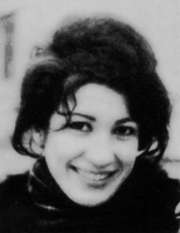|
Биография Forough Farrokhzad
Sfidând autoritățile religioase și marii conservatori, Farrokhzad a exprimat cu fermitate senzațiile și sentimentele situației feminine din societatea iraniană a anilor '50-'60 contribuind în mod decisiv la renovarea literaturii persane din 1900.
Rolul femeii în căsătoria convențională, libertatea propriuzisă în calitate de mamă și femeie liberă, raportul conflictual al femeilor de a nu se putea bucura de propriul corp în libertate i-au dat o forță majoră de a lupta dar și împiedicat bucuria unei vieți normale.
A murit pe 13 februarie 1967 în urma unui accident auto în timp ce se întorcea acasă după vizita mamei sale.
Engleză
Forugh Farrokhzād (January 5, 1935 — February 13, 1967) was an Iranian poetess and film director. Forugh Farrokhzad is arguably Iran's most significant female poet of the twentieth century. She was a brilliant modernist poet and an iconoclast.
Forugh (also spelled as Forough) was born in Tehran to career military officer Colonel Mohammad Bagher Farrokhzad and his wife Touran Vaziri-Tabar in 1935. She was the third of seven children (Amir, Massoud, Mehrdad, Fereydon, Pouran, Gloria) and attended school until the ninth grade, then learning painting and sewing at a girl's school for the manual arts. At age sixteen or seventeen she was married to Parviz Shapour, an acclaimed satirist. Forugh continued her education with classes in painting and sewing and moved with her husband to Ahvaz. A year later, she had her only child, a son named Kāmyār (subject of A Poem for You).
Within two years, in 1954, Forough and her husband divorced. Parviz won custody of the child. She moved back to Tehran to write poetry and published her first volume, entitled The Captive, in 1955.
Forough, as a female divorcée writing controversial poetry with a strong feminine voice, became the focus of much negative attention and open disapproval. In 1958 she spent nine months in Europe and met film-maker/writer Ebrahim Golestan, who inspired her to express herself and live independently. She published two more volumes, The Wall and The Rebellion before going to Tabriz to make a film about Iranians affected by leprosy. This 1962 film was called The House is Black and won awards world-wide. During 12 days of shooting, she became attached to Hossein Mansouri, the child of two lepers, whom she adopted and had live in her mother's house.
In 1963 she published the volume Another Birth and by now her poetry was mature and sophisticated, also being a profound change from previous modern Iranian poetic conventions.
On February 13, 1967, at 4:30 pm, Forough died in a car accident at age thirty-two. In order to avoid hitting a school bus, she swerved her Jeep, which hit a stone wall; she died before reaching the hospital. Her poem Let us believe in the beginning of the cold season was published posthumously and is considered the best-structured modern poem in Persian.
A brief literary biography of Forough, Michael Hillmann's A lonely woman: Forough Farrokhzad and her poetry, was published in 1987. Also about her is a chapter in Farzaneh Milani's work Veils and words: the emerging voices of Iranian women writers (1992).
She is the sister of the singer, poet and political activist Fereydoon Farrokhzad (1936 — 1992; assassinated in Bonn, Germany). Translations into English include those by Sholeh Wolpe, The Sad Little Fairy Maryam Dilmaghani, Sin: Selected poems of Forough Farrokhzad. Nasser Saffarian has directed three documentaries on her; The Mirror of the Soul (2000), The Green Cold (2003), and Summit of the Wave (2004).
|





